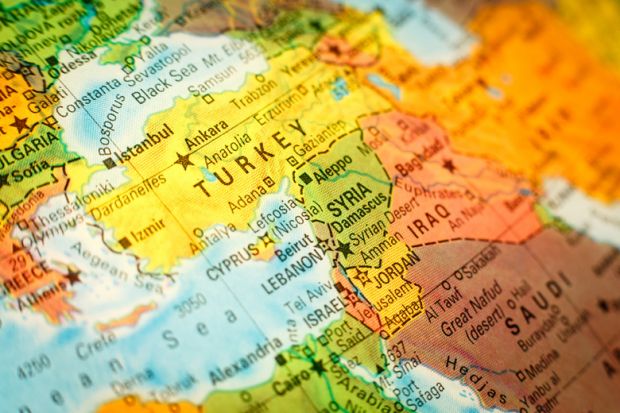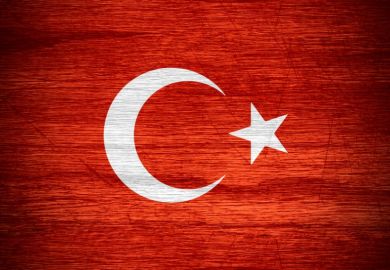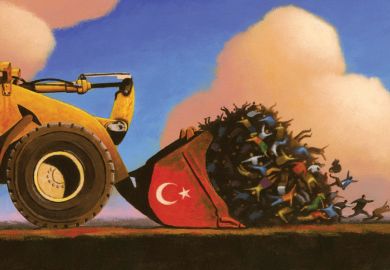Those who are concerned about the higher education system in Turkey were stunned when 1,577 deans were recently asked to resign immediately. Even more shocking was that not a single dean resisted this demand.
Rectors were summoned to Ankara by the Higher Education Council and told that the deans had to resign for the “sake of democracy”. And so they did, for the “sake of democracy”. Anyone familiar with the notion or practice of democracy would, of course, not believe any of this.
Most deans remained as “acting deans” – they were to be examined so as to determine if they deserved to be reinstated.
The message was loud and clear: the regime has full control of universities, and a purge is on the way. The move was presented to the public as a purge. The regime was intact, stronger than ever, and, as President Recep Tayyip Erdoğan said on various occasions, would not hesitate to be ruthless.
The removal of deans was, in fact, a move to instil fear.
If all deans could fall at once, all academics would feel very vulnerable. An atmosphere of chaos already prevailed after the cancellation of all summer leave and a ban on scholars travelling abroad. Recent moves consolidated the fear: rectors of four universities were dismissed.
The Higher Education Council is portraying itself as a saviour of democracy but in fact it is a product of the military coup in 1980. The junta was determined to subdue the universities and all political movements within them, and quickly created a powerful agency to obstruct academic autonomy and freedom. I believe that the council has never been a democratic institution and is a political tool that has recently become ruthless.
The council, of course, denied any wrongdoing in a press release: “The resignation of the deans should be regarded as a precautionary measure to facilitate and precipitate the implementation of the necessary steps to reestablish the autonomy of our universities by severing possible ties with these clandestine and illegal organizations,” it says. The statement reveals why none of the deans resisted. Resistance would be a sign of “possible ties”.
A house of cards
The reality is that higher education in Turkey is a house of cards. After the coup in 1980, many academics were dismissed, harassed and then marginalised for years. The council weakened academic institutions. The person in charge of the council founded the first non-public university and paved the way for universities, driven solely by profit and offering no job security. Populist politics responded to the demand for higher education and new universities, both public and for-profit, were founded.
Soon, there was a shortage of academics. As universities mushroomed, academic departments shrank in size. It became easier to be an academic and the quality of education and scholarship both suffered.
It became easier to become a rector. Close ties to the ruling party were sufficient. Some academic staff were recruited and promoted simply because they were linked with the Gülen movement. The ongoing purge is targeting rectors and academics who were appointed or promoted by the current regime.
This is not a trimming operation. As soon as the state of emergency was declared, 15 universities were closed. Students enrolled in these universities have become academic orphans. Many of these universities were created in the past decade and promoted by the current regime. They were shut only because of alleged ties to the Gulen movement. Otherwise, they are not very different from the recently founded universities that are under the firm control of the ruling party.
The council has asked universities to report on every academic staff member. The following waves will certainly target all academics who are considered opponents – perhaps members of Eğitim Sen, the labour union, and Academics for Peace.
The regime claims that it can cleanse academia and purge bad elements. Academics are frightened and dizzy, as if they are caught up in a washing machine. The machine will wash all colours away and produce a single colour.
It is clear now that rectors will have to toe the government line. There will be one voice, one line, for the “sake of democracy”, a “strong democracy”.
The purge will reshuffle the deck and build a new house. But it will still be a house of cards. Strong academic institutions cannot emerge in a climate of fear and cannot thrive without academic freedom and job security. A single colour indicates the death of universities.
Serdar Değirmencioğlu (serdardegirmencioglu@gmail.com) was professor of developmental and community psychology at Doğuş University in Istanbul.
Write for us
If you are interested in blogging for us, please email chris.parr@tesglobal.com
Register to continue
Why register?
- Registration is free and only takes a moment
- Once registered, you can read 3 articles a month
- Sign up for our newsletter
Subscribe
Or subscribe for unlimited access to:
- Unlimited access to news, views, insights & reviews
- Digital editions
- Digital access to THE’s university and college rankings analysis
Already registered or a current subscriber?








